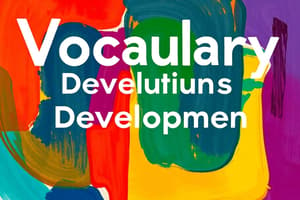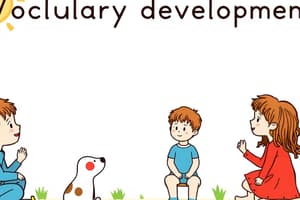Podcast
Questions and Answers
What is the primary benefit of expanding vocabulary?
What is the primary benefit of expanding vocabulary?
- Facilitating easier access to technology
- Enhancing memorization skills
- Improving comprehension and communication skills (correct)
- Increasing reading speed
Which of the following is NOT a strategy for vocabulary expansion?
Which of the following is NOT a strategy for vocabulary expansion?
- Using technology for interactive learning
- Contextual learning
- Ignoring new words (correct)
- Reading diverse genres
Which type of vocabulary consists of words recognized and understood only when read or heard?
Which type of vocabulary consists of words recognized and understood only when read or heard?
- Expanded vocabulary
- Contextual vocabulary
- Productive vocabulary
- Receptive vocabulary (correct)
What type of compound word is 'mother-in-law'?
What type of compound word is 'mother-in-law'?
What is the main purpose of using mnemonic devices in vocabulary retention?
What is the main purpose of using mnemonic devices in vocabulary retention?
Which of the following examples is an open compound word?
Which of the following examples is an open compound word?
Which strategy involves understanding words in their context rather than in isolation?
Which strategy involves understanding words in their context rather than in isolation?
What does a closed compound word look like?
What does a closed compound word look like?
What do the formation rules of compound words suggest?
What do the formation rules of compound words suggest?
Which technique helps incorporate new vocabulary into daily use?
Which technique helps incorporate new vocabulary into daily use?
Flashcards are hidden until you start studying
Study Notes
Vocabulary Development
-
Importance of Vocabulary
- Enhances comprehension and communication skills.
- Expands ability to express ideas and emotions.
-
Strategies for Vocabulary Expansion
- Reading: Exposure to new words through diverse genres.
- Contextual Learning: Understanding words in context rather than isolation.
- Word Mapping: Creating visual representations of words and their meanings.
- Use of Technology: Utilizing apps and online resources for interactive learning.
-
Techniques for Retention
- Repetition: Regularly revisiting new vocabulary.
- Use in Writing and Speaking: Incorporating new words into daily communication.
- Mnemonic Devices: Creating associations to remember meanings.
-
Types of Vocabulary
- Receptive Vocabulary: Words recognized and understood when read or heard.
- Productive Vocabulary: Words actively used in speaking or writing.
Compound Words
-
Definition
- Compound words are formed by combining two or more words to create a new word with a distinct meaning.
-
Types of Compound Words
- Closed Compounds: Words written as a single word (e.g., toothpaste, basketball).
- Hyphenated Compounds: Words connected by hyphens (e.g., mother-in-law, well-being).
- Open Compounds: Words written as separate words (e.g., ice cream, high school).
-
Formation Rules
- Generally, the meaning of the compound can often be inferred from its parts.
- Can include various parts of speech (nouns, adjectives, verbs).
-
Examples
- Noun + Noun: toothpaste, bedroom
- Adjective + Noun: blackboard, greenhouse
- Verb + Noun: swimming pool, washing machine
-
Usage Tips
- Understanding compound words can aid in vocabulary development and reading comprehension.
- Recognizing patterns in compound formation can assist with decoding unfamiliar words.
Vocabulary Development
- Vocabulary is crucial for enhancing comprehension and effective communication.
- A rich vocabulary allows individuals to better express ideas, emotions, and nuanced thoughts.
- Strategies for Vocabulary Expansion include:
- Reading a variety of genres to encounter new words and contexts.
- Contextual Learning helps in grasping words by understanding their use in sentences rather than memorizing definitions.
- Word Mapping visually connects words to their meanings, aiding memory retention.
- Use of Technology through apps and online resources provides interactive and engaging ways to learn vocabulary.
- Techniques for Retention of new vocabulary are:
- Repetition ensures frequent exposure to reinforce memory.
- Actively using new words in writing and speaking helps integrate them into everyday language.
- Mnemonic Devices create associations that make remembering meanings easier.
- Vocabulary can be categorized into:
- Receptive Vocabulary: Words understood when reading or listening.
- Productive Vocabulary: Words used actively in speech or writing.
Compound Words
- Definition: A compound word is formed by merging two or more words to create a new word with a specific meaning.
- Types of Compound Words include:
- Closed Compounds: Written as a single word, e.g., "toothpaste," "basketball."
- Hyphenated Compounds: Connected by hyphens, e.g., "mother-in-law," "well-being."
- Open Compounds: Written as separate words, e.g., "ice cream," "high school."
- Formation Rules:
- The meaning of a compound often derives from the individual words.
- Compound words can comprise various parts of speech, including nouns, adjectives, and verbs.
- Examples:
- Noun + Noun: "toothpaste," "bedroom"
- Adjective + Noun: "blackboard," "greenhouse"
- Verb + Noun: "swimming pool," "washing machine"
- Usage Tips:
- Understanding compound words benefits vocabulary development and improves reading comprehension.
- Recognizing patterns in compound word formation aids in decoding unfamiliar vocabulary.
Studying That Suits You
Use AI to generate personalized quizzes and flashcards to suit your learning preferences.




